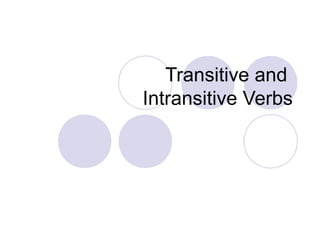
Transitive and intertransitive verbs
- 2. Key terms for transitive/intransitive verbs Direct objects are words that receive the action of the verb. Some verbs have direct objects and others do not. If the verb has a direct object, it is transitive. If it does not, it is intransitive.
- 3. Does it have a direct object? To determine whether a verb has a direct object, Ask: Some whom or what after it verbs will be both transitive and intransitive. It depends on how the verb is used.
- 4. Check out this example: He wrote the manuscript. The verb is wrote. Ask yourself: He wrote (what) Answer: The manuscript is the direct object. Therefore wrote is a transitive verb.
- 5. Another example: The dog shook his tail. The verb is shook. Ask yourself: The dog shook (what) Answer: Tail is the direct object. Therefore shook is a transitive verb.
- 6. Examples of intransitive verbs Mrs. Carper applauded. The verb is applauded. Ask yourself: Applauded (whom or what?) Answer: There is no word to receive the action of the verb applauded and no direct object. Therefore applauded is an intransitive verb.
- 7. The dog shook. The verb is shook. Ask yourself: Shook (whom or what?) Answer: There is no word to receive the action of the verb shook and no direct object. Therefore shook is an intransitive verb.
- 8. The wild, wild world of verbs Verbs are the most confusing part of speech. However, every sentence must have a verb to complete the meaning of the subject. Do not become overwhelmed by all the types of verbs. Write simply and clearly are my words of advice to you.
